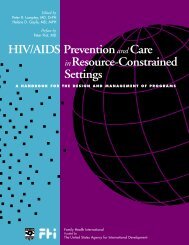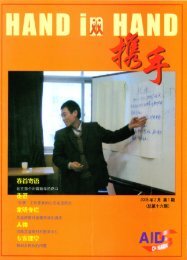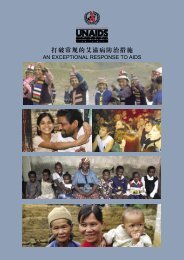The Training of Trainers Manual - UNFPA
The Training of Trainers Manual - UNFPA
The Training of Trainers Manual - UNFPA
You also want an ePaper? Increase the reach of your titles
YUMPU automatically turns print PDFs into web optimized ePapers that Google loves.
participation and real challenges. Proponents <strong>of</strong> youth development programmes and <strong>of</strong> youth-adult<br />
partnerships have in common a belief that youth are caring and capable. Rather than seeing<br />
youth as problems to be managed, youth development proponents view young people<br />
as valued resources.<br />
Proponents <strong>of</strong> youth-adult partnerships see young people as individuals with the capacity to make<br />
positive and wide-ranging contributions when they receive support and the opportunity to develop<br />
their skills. Few things can more concretely demonstrate a belief in young people’s capabilities than<br />
when trusted adults share with youth the power to make decisions.<br />
<strong>The</strong> literature leaves little doubt that youth involvement benefits those youth who participate<br />
meaningfully in programmes. By providing young people the opportunity to develop skills,<br />
competencies, leadership abilities, self-confidence, and self-esteem, youth involvement programmes<br />
contribute to building resilience, a protective factor that can help prevent negative health outcomes<br />
and risky behaviors.<br />
Impact on adults and community<br />
Youth involvement also has an impact on adults involved in the partnerships. A U.S. study examined<br />
organizations in which youth had decision-making roles such as advisory board members, staff<br />
members, peer educators, and programme planners. Interviews and focus group discussions<br />
with young people and adults from 31 organizations showed that adults began to view youth as<br />
competent individuals who contributed to the organizations rather than simply as receiving its<br />
services. <strong>The</strong> energy <strong>of</strong> youth also enhanced adults’ commitment to the organizations and their<br />
ability to work collaboratively.<br />
<strong>The</strong> study found that adults:<br />
■ Experienced the competence <strong>of</strong> youth firsthand and begin to perceive young people as<br />
legitimate, crucial contributors<br />
■ Found their own commitment and energy was enhanced through their work with youth<br />
■ Felt more effective and more confident in working with and relating to youth<br />
■ Understood the needs and concerns <strong>of</strong> youth, became more attuned to programming issues, and<br />
gained a stronger sense <strong>of</strong> connection to the community<br />
■ Received fresh ideas from different perspectives<br />
■ Reached a broader spectrum <strong>of</strong> people<br />
■ Developed more relevant and responsive programming and services<br />
■ Shared knowledge<br />
<strong>The</strong> study also identified positive outcomes for the organizations:<br />
■ Young people helped clarify and bring focus to the organization’s mission.<br />
■ <strong>The</strong> adults and the organization, as a whole, become more connected and responsive to youth<br />
in the community, leading to programming improvements.<br />
Section 4. Participant Handouts<br />
173

















